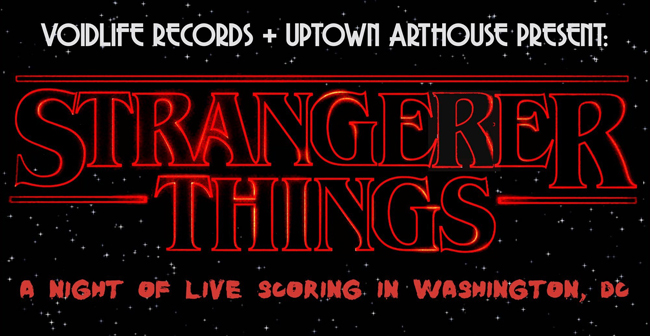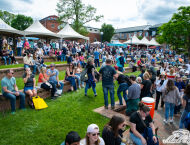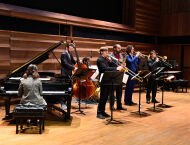Music

Stranger-er Things: Live Scoring at Union Stage
January 22, 2018 @ 12:00am
Television is in the zeitgeist now more than ever. Streaming platforms fiercely compete to create the most gripping content, old favorites are widely available and television is accessible from nearly any connected device – Merriam Webster even added the term “binge-watch” to the dictionary in 2017.
Even if one consumes episodes alone, as most binge-watchers do, the solitude ends when episodes do. Then begins the highly social and ritualistic debrief via family, friends and forums, rife with speculation about the next episode, season or unanswered questions. Chances are you and whatever quasi-acquaintance you’re straining to spark a conversation with both share enthusiasm for at least one of the popular shows available.
Regardless, it’s more appealing to hear about whatever show someone is infatuated with than it is to discuss the weather or another bread-and-butter conversational default. All of this engagement with the medium makes it natural to wonder what its limits are.
The newly-opened Union Stage at District Wharf recently hosted an event that explored such a topic: Stranger-er Things: A Live Scoring. Held on January 16, the event marked a joint effort between DMV record label VoidLife and DC art collective Uptown Art House, featured three local bands live-soundtracking three popular TV shows: Dr. Who, Twin Peaks and The Twilight Zone.
VoidLife Founder Asher Meerovich and guitarist in The Void House Band says Stranger-er Things was inspired by a friend who had organized a similar event, but with movies instead of television. The idea also fit with VoidLife’s goal of creating unique experiences that encourage the audience to think outside of the box, he says. More importantly, the concept felt appealing enough to attract an audience amid a sea of alternatives – including staying home and watching Netflix.
“The event is on a weekday, so we wanted to create something after work-friendly rather than standing on your feet for three hours,” Meerovich says. “It’s also an effort to create a new experience at a music venue that is easy to process.”
Judging by the vigor with which the crowded venue greeted Meerovich, who was also the emcee, when he took the stage, they bought in. After a brief introduction that included a joke about a music-based cryptocurrency, he cleared the way for Uptown Renaissance – a supergroup of Uptown Art House affiliates – to kick the night off.
The group played music over the first two of a six-episode seminal Dr. Who storyline, “Genesis of the Daleks.” The episodes are set in a bleak and war-torn landscape – complete with bunkers and trenches – and follow three travelers who are captured and confronted with death. Throughout, the music serves as a stand-in for dialogue, clarifying and amplifying the emotions viewers should feel.
At one point, a gas attack occurs and causes mayhem. The two men in the group are dragged into an adjacent bunker by soldiers, while the sole woman is left behind, incapacitated. Disillusioned, associative vocals meditate on life and convey the captives’ loopy, chemically-induced unease as they are led deep into the concrete annals. The woman is eventually captured as well – by a separate group – after a slow pursuit made menacing by a swell of swampy, sticky synths.
The episode comes to a head when both the men and the woman face respective forms of apocalyptic weaponry at the hands of their captors. The lyrics in these scenes slowly turn from fatalistic to cautionary, referencing nuclear war and playing on the danger of living silently. Once we’re gone, we have no option but to be quiet – so we may as well make noise now.
By episode’s end, the three travelers escape death. Elated and distorted vocals launch the “outro” before giving way to determined freestyle mumble rapping and finally fading out. Meerovich comes out, drums up additional applause for the Uptown Renaissance, and transitions from emcee to guitarist for the next act: The Void House Band.
The Twilight Zone is the show, “Time Enough at Last” is the episode and Henry Bemis is the character. Emptily pleasant music bellows, befitting Bemis’ bank job. The music – and his expression – shift in excitement as he shirks, surreptitiously indulging in his true passion: reading. But, of course, his boss catches him. Poor Bemis can’t catch a break at home either. Abrasive guitar riffs interrupt him reading in his armchair and signal danger.
Bemis’ wife enters the room. The music melts into full-on sorrow as she – with a malicious joy – confiscates and tears up his reading material. Fed up, Bemis absconds, literature in tow, to the tranquility of his employer’s large bank vault. He skims and disinterestedly discards a newspaper with a headline mentioning an H-bomb. Just then, a massive explosion rollicks the vault.
Bemis climbs to the surface to utter devastation. Empathetic guitars wail and cry out as Bemis searches fruitlessly for survivors. A revolver is all he finds. Barrel to his head, he notices mounds of intact books surrounding the razed library. But before he can read a word, his thick spectacles shatter on the ground. The room’s lighting dances as the camera zooms out on a blind, utterly alone Bemis. The band launches into an existentially dreadful, doom metal-tinged “outro,” continuing to mirror Bemis’ emotions until the end.
The last act is Zack Be, scoring “Part 8,” a difficult-to-follow pastiche of an episode from last year’s Twin Peaks miniseries reboot. Zack Be opens with an interpretation of the original Twin Peaks theme music. After a grizzly murder, the Nine Inch Nails appear on the screen. Zack Be’s vocals sync up with Trent Reznor’s onscreen singing, nesting a cover within their score.
It’s then 1945 and the camera creeps toward the mushroom cloud from the world’s first nuclear bomb test. A violent blend of noise and distortion blare as the camera burrows into the heart of the vicious cloud.
A gaunt man in a tuxedo and a bejeweled woman watch this explosion from a castle atop a rocky monolith protruding from the sea. He begins spewing golden, cosmic dust from his mouth. It forms into an orb, and with the support of shimmering synths, the woman feeds the orb into a pipe that shoots it to the earth.
Fast forward to 1956: a strange creature emerges from a shell amid groaning, animalistic guitar noodling. We then see a teenage couple stop and grab a face-up penny as the band conjures a muggy, woodsy summer night with cricketing, ribbiting synths. The couple kisses one another goodbye and spacey drums capture the blissful melancholy of perfect night’s end.
The episode closes with a series of graphic murders in a radio station. The assailant then hijacks the radio, and deranged but contained vocals overdub his salvo. Radio listeners in various locations, including the previously mentioned teen girl, fall unconscious. As the episode ends, the strange creature from earlier climbs into the slumbering girl’s mouth and the music fades back to the Twin Peaks theme. Meerovich then takes the stage to applause and thanks the crowd once more.
The whole experience felt wonderfully off-kilter – wait service and strangers are not exactly staples of my television consumption. But what was most interesting to me was trying to process what I was watching. Television with a cooler, louder soundtrack? A concert with excellent visuals? I’m still unsure. For Meerovich, that was exactly the point: to break down barriers between different forms of media and inspire others to do the same.
“I want the audience to be like, ‘Yeah that was weird,’” he says. “But it would be even cooler if people could walk away and say, ‘Maybe the boundaries aren’t so crazy, maybe I should do what I want.’”
For more information about VoidLife’s upcoming live scoring events, click here.
Union Stage: 740 Water St. SW, DC; 877-987-6487; www.unionstage.com







